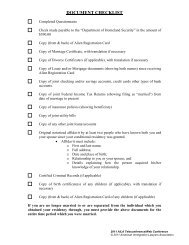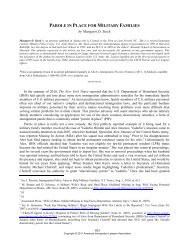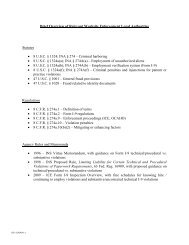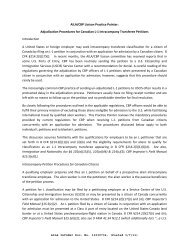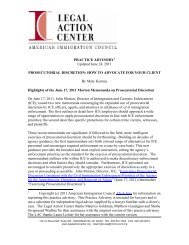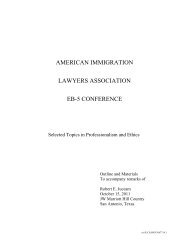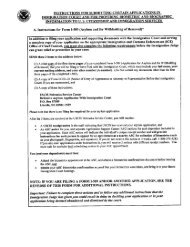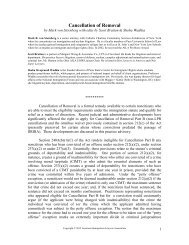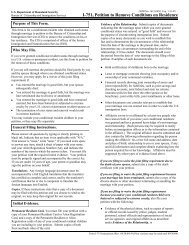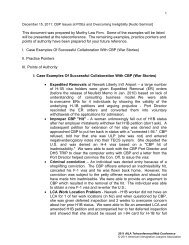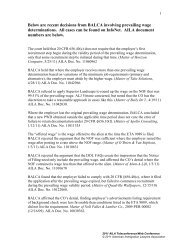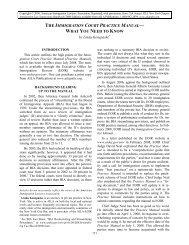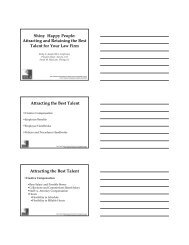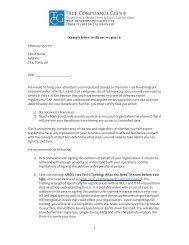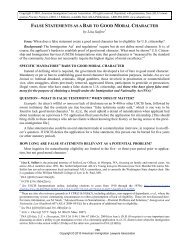Immigration Practice Pointers, 2010-11 Ed. - AILA webCLE
Immigration Practice Pointers, 2010-11 Ed. - AILA webCLE
Immigration Practice Pointers, 2010-11 Ed. - AILA webCLE
You also want an ePaper? Increase the reach of your titles
YUMPU automatically turns print PDFs into web optimized ePapers that Google loves.
PM-602-0017: Subject New INA Section 204(l) –<br />
Approval of Petitions and Applications after the Death of the Qualifying Relative<br />
AFM Update 10-51<br />
Page <strong>11</strong><br />
the new section 204(l) of the Act extend not only to the approval of the pending petition,<br />
but also to any related applications, the fact that the qualifying relative has died will be<br />
noted in the decision and deemed to be the functional equivalent of a finding of extreme<br />
hardship. Note that 204(l) applies in this context only when, the hardship being claimed<br />
by the surviving beneficiary, would have been on account of claimed extreme hardship<br />
that would have been suffered by the qualifying relative were he or she still alive.<br />
Additionally, it should be noted that the finding of extreme hardship merely permits, and<br />
never compels a favorable exercise of discretion. See Matter of Mendez-Moralez, 21<br />
I&N Dec. 296 (BIA 1996). That is, as with any other waiver case, a waiver application<br />
decided in light of section 204(l) requires the weighing of all favorable factors against<br />
any adverse discretionary factors. Extreme hardship is just one positive factor to be<br />
weighed. See id. The inadmissibility ground sought to be waived is, itself, an adverse<br />
factor. See INS v. Yang, 519 U.S. 26 (1996). For example, inadmissibility based on a<br />
conviction for a violent or dangerous crime requires proof of exceptional or extremely<br />
unusual hardship, or some other extraordinary circumstance, in order for a waiver<br />
application to be approved. 8 C.F.R. § 212.7(d).<br />
The preceding paragraph assumes that the qualifying relative was already a citizen or<br />
permanent resident at the time of death. If the qualifying relative was not already a<br />
citizen or permanent resident, then the qualifying relative’s death does not make the<br />
alien eligible for a waiver that would not have been available if the qualifying relative<br />
had not died. If the qualifying relative was not a citizen or permanent resident, then the<br />
alien may not be able to obtain a waiver of inadmissibility unless there is yet another<br />
individual who has the requisite status and family relationship to meet the requirements<br />
of the waiver provision, or the waiver provision does not require a family relationship<br />
and/or extreme hardship.<br />
As noted in Chapter 10.21(c)(2), section 204(l) does not apply to Form I-130 that was<br />
filed by a now-deceased citizen for his or her spouse, who is now the widow(er) of a<br />
citizen. Once the citizen has died, the widow(er) becomes the visa petitioner. USCIS<br />
has determined, however, that if the widow(er) was the beneficiary of a pending or<br />
approved Form I-130 when the original petitioner died, and the widow(er) meets the<br />
residence requirements in section 204(l), then section 204(l) preserves the widow(er)’s<br />
ability to have a waiver application approved as if the now deceased citizen had not<br />
died. As with any other waiver application that is covered by section 204(l), the fact that<br />
the citizen petitioner has died will be noted in the decision and deemed to be the<br />
functional equivalent of a finding of extreme hardship. But the finding of extreme<br />
hardship merely permits, and never compels a favorable exercise of discretion. See<br />
Matter of Mendez-Moralez, supra. The widow(er) must still establish that he or she<br />
merits a favorable exercise of discretion.<br />
(6) Discretionary Denial under Section 204(l). Section 204(l) gives USCIS discretion<br />
to deny a petition or application that may now be approved despite the qualifying<br />
<strong>AILA</strong> InfoNet Doc. No. <strong>11</strong>0<strong>11</strong>061. (Posted 01/10/<strong>11</strong>)



